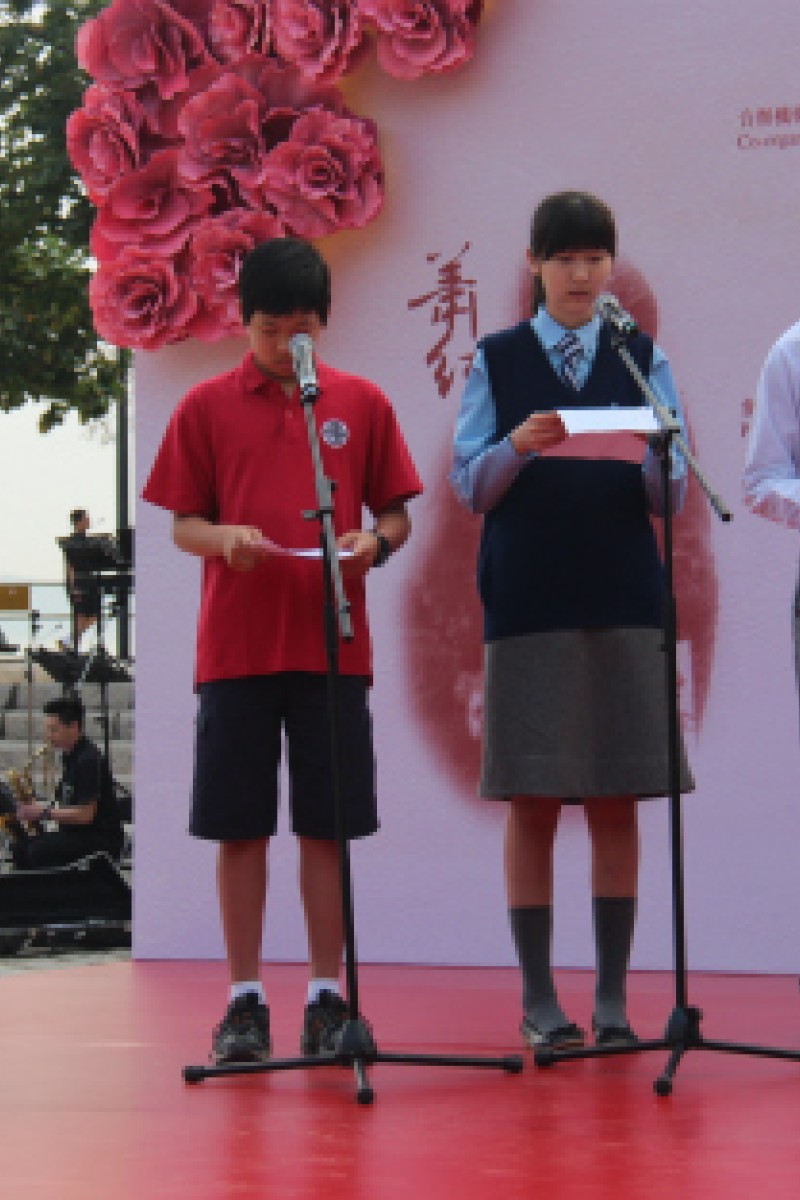 (From left) Poet Zheng Danyi, Kevin King (Hong Kong International School), Leung Siu-yeung and Tiffany Lu Jiayin (St Stephen's College) perform poetry reading at a literature gala in Repulse Bay.
(From left) Poet Zheng Danyi, Kevin King (Hong Kong International School), Leung Siu-yeung and Tiffany Lu Jiayin (St Stephen's College) perform poetry reading at a literature gala in Repulse Bay."The sunsets in this place are beautiful to behold. There is a local expression here - "fire clouds"; if you say "sunset", no one will understand you ...," he says. It's an extract from Tales of Hulan River.
Behind him is the fiery, sinking sun, creating the perfect atmosphere for such words.
Siu-yeung, along with five other Hong Kong students, was invited to read poems at the Southern District Council's "Love in Spring" Literature Gala at Sunset on March 23. The event promoted the literary arts among the public.
Like many students, Siu-yeung finds the sophisticated language of poetry off-putting at times.
But the 16-year-old picked up some useful tips during a coaching session with Hong Kong-based mainland poet, Zheng Danyi.
"You have to read poems out loud to [understand] their meaning," Zheng says, explaining why he made the six students, including Siu-yeung, read aloud onstage.
"They initially had no idea what the poem meant. But after reading it out loud, they understood a lot better."
Originally from Sichuan , Zheng studied chemistry at Southwest Agricultural University, and was later a tutor at the College of Agriculture at Guizhou University. Although professionally trained as a chemist, he always had a strong passion for literature, and started writing his own poems when he was just eight years old.
He also wrote many literary pieces during his time at university.
Zheng moved to Hong Kong in 1999, and four years later, published his most well-known poetry collection, Wings of Summer. Today, he is a freelance writer.
In poetry, writers may get lost in their picturesque surroundings. Then, with a sudden burst of inspiration, they put their feelings into words by describing their environment.
"Sound can be used to touch people's hearts, but without sound, poems could be pieces of written words," Zheng says.
"Through reading poems aloud with passion and a variety of tones, a poem can be brought to life."
Oral communication is also the most original form of interaction in human history, he says, adding that this is why reading poems aloud is necessary for someone to fully enjoy the art form.
"Not only did I understand the content of the poem, but I could also feel the emotion of the writer by reading it out loud," says Siu-yeung. "That's a really beautiful thing."
To cultivate a love of literary arts, Zheng suggests students start by reading what they like - be it romance, politics or philosophy.
As they progress to a higher level, he says, they should develop a taste for different genres.
"Poetry is everything as a whole - including classics and modern works, from realism to modernism," he says. "It's like growing up. By sifting through everything, you acquire enough nutrients to grow."
To promote literature in the city, a literary trail from Pok Fu Lam to Stanley is being established, and is due for completion next year. It will help visitors learn about the backgrounds and writings of a range of writers and poets who have strong ties to Hong Kong.
But for now, as the sun sets, the student readings come to a close.
The group recites the last verse: "The drowsy children return home to their rooms and go to sleep. Some are so tired they cannot make it to their beds, but fall asleep lying across their elder sister's legs or in the arms of their grandmother."
